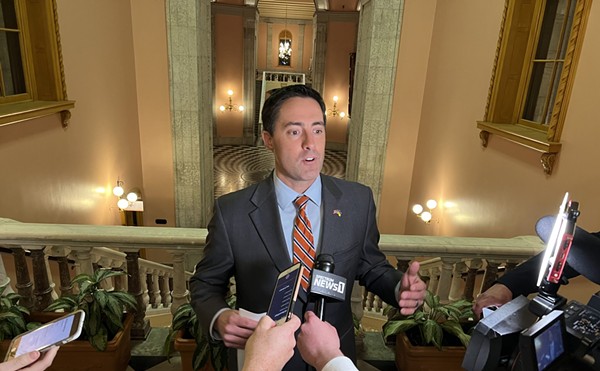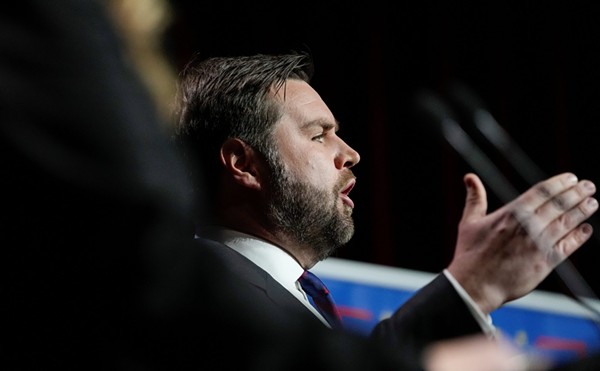David Zanotti, president of the Ohio Roundtable and dedicated opponent of state-sponsored gambling, sat in the back of the room. Zanotti, 47, presents a trim and tidy appearance -- like a naval officer in civilian clothes. He took notes with mechanical pencil, a cloth-bound copy of the Ohio Constitution opened on his lap.
The bill's sponsor, Lou Blessing, a Cincinnati Republican, was the first to testify. Ohioans already gamble at casinos in neighboring states, Blessing argued pragmatically, so let's keep their lost wagers at home. Budget makers are looking at a $4 billion deficit in the next two years, and slots would provide the state $500 million annually, he said.
Racing lobbyists, eager to vanquish the image of the state descending to the level of Atlantic City, played up the misty-morning majesty of horse rearing. Jack Hanessian, the general manager of River Downs in Cincinnati, described how racetracks are to horses what county fairs are to prize steers. Slots, according to Hanessian, were needed to keep the show rings viable.
Then, a little later, Hanessian slipped. "We ought to let the people decide if they want casinos," he said.
Gambling proponents avoid the term "casino." They can't even bring themselves to use the word "slots"; instead, they prefer "video lottery terminals."
Hanessian tried to correct himself, but it was too late. "Thank you very much," Zanotti said, jotting the quote in small handwriting.
For Zanotti, gambling is a rebellion that needs periodic quashing. In 1990 and 1996, Zanotti worked to defeat ballot issues that would have opened the way for casinos in Ohio. On both occasions, his contingent won big. But Zanotti is not a one-note zealot. The conservative activist also helped bring about term limits and vouchers, and most recently, heralded the tortured decision to bring criticism of evolution into state classrooms as a victory for "freedom of thought and expression."
But as often as Zanotti is quoted in the newspaper or argues casinos with Mike Trivisonno on WTAM, seldom is the mission of the Ohio Roundtable fully explained. Part of the problem is the plethora of similarly named organizations across the state, such as Greater Cleveland Roundtable, which works for improved race relations, and the Ohio Business Roundtable, a CEO group. (Even Joe Hallett of The Columbus Dispatch, an old pro, recently called Zanotti's outfit a "business consortium," possibly thinking of the latter group.) But Zanotti's Roundtable has a far different agenda.
Since the group's inception in 1980, according to Zanotti, its mission has been "the restoration of traditional principles of American public policy."
"If you start with the Declaration of Independence and you go to the Constitution, and then you throw in the Northwest Ordinance and the Ohio Constitution of 1802," he explains, "we're pretty good right there."
Fife-and-drum imagery notwithstanding, the Roundtable, based in Strongsville, has pursued issues usually ascribed to the religious right. Its causes have tended to be anti-sin (gambling, pornography) or pro-sectarian (vouchers, intelligent design). In fact, the Roundtable's stated goal is the restoration of "traditional Judeo-Christian principles" -- the Judeo-Christian bit just has a way of disappearing when the audience leans secular.
Zanotti, however, resists any comparisons between the Roundtable and the likes of the Christian Coalition. Even the conservative tag bothers him. "I don't view us as a conservative organization, because I don't know what that means anymore," he says. "People say Bob Taft is a conservative, but I can talk to 20 people who call themselves conservative, who wouldn't think Taft is even that."
Talking to Zanotti is like trying to put leg irons on a rabbit.
There is no disputing he is good at what he does. When Zanotti takes a side, the side usually wins. This past summer, the U.S. Supreme Court ruled that Cleveland's voucher program was constitutional, and Zanotti was in the front row of the gallery during the arguments. He offered more than moral support. Roundtable trustee Frank Griffith says that in a recent newsletter, Zanotti, after months of hinting, finally took credit for suggesting evidence that Justice Sandra Day O'Connor had cited in her assenting opinion. He is as dogged as he is smart. "If you're in a fight with Dave Zanotti, you're in a fight with a bulldog," says Roundtable Chairman John Jazwa, who owns a West Side paper distributing business.
Even ideological foes are impressed by Zanotti. "I think he's a good, hardworking, honest guy," says state Senator Eric Fingerhut, an East Side Democrat. "He just happens to have some kooky views." Despite the fact that Zanotti equates public education with stifling bureaucracy, Cleveland Teachers Union President Richard DeColibus agrees that he is "very intelligent, very reasonable . . . the kind of guy you agree to disagree with." Says Bill Phillis, the executive director of the school coalition that challenged the constitutionality of the state's educational funding method: "He's no dummy, I'll tell you what."
Zanotti, likewise, respects his adversaries. On the day of the slots hearing, he ate lunch at the Athletic Club of Columbus, which sits across the street from Capitol Square. Senator Fingerhut sat two tables away. "That guy would make an amazing governor," Zanotti said, motioning in Fingerhut's direction. "I'd fight him tooth-and-nail on everything, but he's a great man with great gifts."
To Zanotti, strength of conviction matters as much as the conviction itself. For this reason, he is no fan of the deferential Bob Taft. He's not chummy with House Speaker Larry Householder or outgoing Senate President Richard Finan, either, even though both are Republicans. Unlike other activists who suck up to power (the Ohio Taxpayers Association might as well be called the Larry Householder Association), Zanotti refuses to kiss rings. "In a system where compromise is a promoted virtue, he stands on principle, and he succeeds," state Representative Tim Grendell (R-Chester Township) says. "That's a message I find inspirational." Says his older brother Martin: "I always kid him that you're either for him or against him."
Martin is the mayor of Parma Heights, the town where he and David grew up. Martin says theirs was a typical baby-boom childhood in a family that valued church and community. But just before graduating from Valley Forge High School in 1973, David attended a youth-for-Christ retreat and discovered a spirituality he hadn't found in his parents' Catholic church.
"Coming out of high school, I was in a lot of trouble," David says. "I was hanging with a pretty bad crowd of people. I had a pretty profound experience in coming to understand that Jesus Christ wasn't just a historical figure; that he actually was credible. That realization made a very big impact on me. When I went to college, I wanted to find out why so many people disagreed, why the concept of biblical Christianity was so contested in the culture. Was there really a historical Moses? Was the Bible filled with mistakes? I thought I knew what I believed. I thought I had had a pretty life-changing experience, but I needed to know if it was for real or if I had just been caught up in some emotional thing." Zanotti tells this story as if lighted by campfire.
"So I went back to the deep, dark, dusty recesses of the library, to where people didn't like to read those books. I asked myself some pretty tough questions. I came out with some pretty solid answers and outcomes rationally: that biblical Christianity is historic; it is legitimate. That the resurrection of Christ is in fact a historical event that was attested to by honest people."
Martin, for one, was not shocked when David embarked on his own spiritual quest. "David marches to the beat of his drummer," he says. "David makes no decisions in a void. He knows what he's doing and challenges things constantly."
David studied communications and theology at three different Ohio colleges. By following a curriculum of his design and transferring so often, he failed to earn a four-year degree from any of them, though he went ahead and did graduate work at Ashland University. (He also sold Amway, according to Martin.) He turned his attention to politics and history after attending a lecture conducted by Dr. Francis A. Schaeffer, a Christian philosopher. Schaeffer's landmark 1976 book and film, How Should We Then Live? The Rise and Decline of Western Thought and Culture, made the case that civilization without a Judeo-Christian ethic is lost.
With a young family to support (he and his wife have three children), Zanotti put aside his studies and joined his father's metals business. Then he discovered the Ohio Roundtable in 1985.
The Roundtable's origins are somewhat murky. The website describes how "concerned citizens and business leaders in Northeast Ohio began meeting together to prayerfully consider changing the direction of American public policy." One principal organizer, Chardon attorney Mark Hassett, says his spirit was moved by Ronald Reagan's message of lower taxes, smaller government, and strong defense. The Northeast Ohio Roundtable, as it was then called, took cues from a "national roundtable" movement, but Hassett doesn't offer specifics. Zanotti, too, is vague; he says the founders came to believe the country was "losing a lot of what used to be viewed as American. We're losing a lot of understanding of our history."
Newbury businessman Jay Menefee, another founding organizer, identifies the national movement as the Religious Roundtable, which sought to steer policy on abortion, military strength, pornography, and divorce toward the morally "correct" position. Jerry Falwell was an original board member, and Jesse Helms, Phyllis Schlafly, and Pat Robertson were among the speakers at its first political action rally. "Over the years, I think we've made a pretty good dent in waking up churchgoing people to the fact that they can make a difference in this world before the next," says Menefee, the Ohio Roundtable's chairman until 1999.
Asked about the Religious Roundtable, Zanotti downplays its significance. The Ohio Roundtable founders, he says, "never really desired to be part of the Religious Roundtable, because they didn't want their message to be viewed as a religious message. They wanted to talk about the Declaration and the Constitution and the principles. They didn't want to get sidelined into the assumption that those are topics that are exclusive to the quote-unquote religious right."
But the Roundtable members do uniformly appear to come from a 700 Club orientation. Griffith, for instance, was first attracted to the Roundtable from its work in favor of home schooling. Griffith earned his MBA at John Carroll several years ago, and, by the sound of it, he's still carrying a grudge against a professor who thought corporate America should be providing universal child care. Jazwa believes that fellow Roundtable booster David Brennan has the right ideas about education, even though the fourth-grade proficiency test scores at Brennan's charter schools are terrible. He also is in favor of a public smoking ban.
"If you want to call us a bunch of moralists, I plead guilty," he says. "I guess I don't see anything wrong with morals and character. We just went through a presidency that was one of the worst things that happened to our country."
So, while the public symbol of the Roundtable is the quill, the cross might be a more fitting emblem. The Roundtable produces an online voting guide for Ohio and parts of Pennsylvania called USAVoter.info. The site intends to look impartial, like something the League of Voters might produce, yet the questionnaires for candidates seem to have been written from a pulpit. Even contestants for state auditor were asked about Roe v. Wade, human cloning, the pledge of allegiance, and the definition of marriage.
Zanotti says the site got a million hits in the last 10 days before the election, despite zero advertising. He's pleased to provide the service, as he believes the fear of casting an ignorant vote is the main reason Americans go to the polls in such low numbers. "If you try to encapsulate everything we do in a word or two, it would be responsible citizenship," he says.
This is Zanotti at his most disingenuous. A man who says he devised a plan to kill the school-funding case once and for all -- at the request of then-Governor Voinovich, no less -- is not in a position to play debate moderator. As much as he likes to imagine himself on the village green, Zanotti is really preaching to the choir. One of the Roundtable's primary means of communication is the daily radio address that Zanotti delivers over a few dozen stations in Ohio and neighboring states. He calls the address the NPR-sounding "The Public Square," but the stations carrying it are predominantly religious. Little wonder, then, that the main criticism of the voting guide Zanotti hears is "that we don't tell people whom to vote for."
Zanotti seems to believe he can step in and out of partisanship as if it were a pair of pants. After the election, The Plain Dealer's Sandy Theis wrote that the Ohio Roundtable and Ohio Right to Life "had urged its faithful to sit out the governor's race, mainly because they opposed Taft's selection of a running mate who is pro-choice and pro-gay rights." In a letter to the editor, Zanotti disagreed, claiming that he had merely discussed the concept of such a campaign as a private citizen and volunteer chairman of the Liberty Committee, his political action committee. So there.
"One of the things that bothers me about this place is the pervading sense of self-importance," Zanotti said as he left the Ohio Senate Building. "This is like a high school that wants to be a college."
Zanotti was galled by the slots bill. He thought it an especially sneaky piece of legislative sleight of hand, and it was hard to disagree. The bill was introduced as "emergency legislation," meaning that if passed, the law would take effect immediately, making it that much harder to repeal by referendum. Majority Republicans were also dangling goodies -- such as a tuition freeze at community colleges -- to minority Democrats in exchange for their support. Especially for the occasion, Zanotti wore a necktie stitched with trains. The message: Ohioans were getting railroaded.
Zanotti is not a beloved figure on Capitol Square. He blasts misbehaving Republicans and Democrats with equal flair. The intelligence and certainty he brings to argument can come across as arrogance. His unpopularity is more than a matter of style, though; he changed the rules of the game. "There's a lot of people who still have a target on my back because of term limits," he says. "They blame us every time it rains."
The passage of term limits, which prevents House and Senate members from running again after eight years in office, marks Zanotti's most profound moment in state politics. Zanotti and Jazwa ran the 1992 campaign, which collected more than 600,000 signatures necessary to put the issue on the ballot. Voters approved term limits by a two-to-one margin.
Ohio hasn't been the same since. Term limits put an end to the likes of Vern Riffe, the Appalachian Democrat who spent 36 years in the House and banged the speaker's gavel for 20. "There was a period of time in Ohio where, if you wanted to get a bill passed, you had to do two things," Zanotti says. "You had to go to the Galleria and sit and drink with the Speaker of the House, and then you had to make sure that you gave at least $5,000 at his many birthday parties. That was the way you got an appointment. If you didn't do that, don't bother."
Incumbency does have a lurid side, but there are those who believe that, under Riffe, at least things got done. Earlier this year, Plain Dealer Editorial Page Editor Brent Larkin declared state government "officially a train wreck," with one-party rule and term limits largely to blame.
Larkin is not alone. Republican Roy Ray was a state senator for 14 years. Now the vice president of finance at the University of Akron, he says he would have served another 14, had it not been for term limits. Ray thinks term limits are fool's gold. "The unintended consequences are that you have empowered the administration, empowered lobbyists, and empowered staff," he says. "You have not empowered the electorate. You have really partially disenfranchised the electorate, because they may like the guy or woman in there, and her term limits are up, and she's out."
State Representative Ann Womer Benjamin agrees. With her term set to expire, she recently ran for Jim Traficant's old seat and lost. The Aurora Republican says she supported term limits originally, but now thinks it silly that the state imposes a lack of experience on its legislators. "I've dealt with issues over the last eight years that, once I'm gone, very few people will really know about, and they're going to come up again."
These are not new arguments, and Zanotti has heard them all before, including the one that says, if the framers of the Constitution had wanted term limits, they would have written them in. "The notion that there would not be rotation in office was unthinkable to the founders," he says. "They debated term limits and frankly didn't go with them, because they didn't think anybody would dare try to build a life out of serving public office. Public office in the constitutional era was public service. You went there often without pay. It was an issue of sacrifice. You did it for the good of your country; it was like going into the army."
Lawmakers returning to their farms and shops, like soldiers after the battle at Yorktown, is an appealing thought -- and a planet or two away from reality. Term-limited politicians aren't going home; they're running for different offices or accepting plum political appointments (Womer Benjamin was just named director of the Department of Insurance) or passing the baton to relatives. The only "sacrifice" appears to be the inconvenience of printing new business cards.
Even Zanotti seems confused. One year, the Roundtable gave its Leadership in Government Award to George Voinovich, who has quite obviously built a life out of public office. Tim Grendell, this year's winner, occupies a seat his wife filled before term limits moved her to run for judge. Grendell himself was somewhat surprised to win. "I had heard through the grapevine that family members following other family members wasn't consistent with their view of term limits," he says. But his performance might have something to do with the Roundtable's change of heart. In his first term, Grendell has proved himself one of the most conservative members of the House.
If Zanotti tends to brown-bag his motivation, he is surprisingly direct in other matters. This past summer, the Roundtable held its annual Making a Difference banquet at the downtown Marriott. The "celebration of positive change" also served as a fund-raiser. When asked how the function went, he cut to the chase: "We raised about $100,000," he said.
Until recently, the Roundtable derived most of its funding from a small group of donors, like Fred Lennon, the late valve manufacturer who gave generously to Republican candidates and causes. In 2000, the Roundtable received more than $870,000 from just nine sources, according to tax records. But Zanotti told the banquet crowd that 9-11 and a sinking economy had diminished contributions by 40 percent. He sounded sincere. "We're hurting," he said. "Sometimes hurting does good things for you. Sometimes hurting just hurts."
Zanotti also explained how the Roundtable's funding model had changed. In 1987, near the time he was named president, the Roundtable took 80 percent of its money from 20 percent of its donors. Today, half of the Roundtable's contributions come in chunks of $1,000 or less. "We don't have a bunch of sugar daddies saying, 'Hey, don't worry, here's $100,000 you can count on,'" Zanotti says.
Fat cats come and go, but at least the Roundtable has been able to count on its scholarly and charismatic point man. "I've seen other organizations fall apart because the president wants to sit back, draw a salary, and put out a newsletter once in a while," Jazwa says. "Dave doesn't work that way. Dave cares."
If Zanotti left, it would be interesting to see what would become of the Roundtable. Menefee, a founder, says he left the organization in part because he felt it had become too synonymous with its president. "I'm more inclined to be institutionally driven," Menefee says. Zanotti, in turn, says that Menefee did not receive enough votes to stay on the board. "With a lot of charitable organizations, they have to continue to grow and to expand; and I think some of the founders had a problem with the growth model," he says. Still, the current trustees, too, worry what would happen to a Roundtable without Zanotti. "We'd like to think we have three people trained to take over, but we don't," Jazwa says.
Zanotti has been tempted to look for more lucrative work. One child is in college, and two will follow soon. He could also run for office. In 1997, Secretary of State Ken Blackwell asked him to be his running mate in the governor's race. Zanotti refused the offer. "I questioned whether he had the stamina to question the establishment," he says of Blackwell.
As usual, his instincts were right. Money and endorsements made Taft the prohibitive favorite for the Republican nomination. Blackwell quit his bid not long after Zanotti said no. "In the end, I would have been left standing in the cold," he says.
Zanotti is smart enough to know that politicians have less influence than may appear to those on the outside looking in. Few people in the state, elected or otherwise, have left the imprint that he has in the last 15 years. "I look at eight years of being governor and all we've been able to accomplish, and there's something to be said for longevity," he says.
There might come a time, Zanotti says, when running for statewide office "fits with the mission," and woe to his opponent. This is a man who can win a debate. Even deprived of a portion of the alphabet.cut











